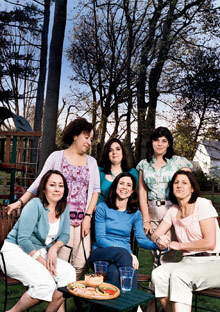An Inconvenient Youth: Raising Children with Autism

Photo: Alessandra Petlin
PAGE 2
One of the most crucial and misunderstood aspects of autism is that it covers a wide range of disabilities. The brain development disorder—or more accurately, autism spectrum disorders (ASDs)—includes autism, Asperger's syndrome, and pervasive developmental disorder not otherwise specified, all of which impair thinking, behavior, language, and the ability to relate to others. Each child on the spectrum is a uniquely scrambled, genetic Rubik's Cube in terms of how his or her disorder manifests, how severe it is, and what medical issues accompany it. Although some autistic kids may respond well to some of the popular treatments, others, for baffling reasons, do not. ASDs affect about one out of 150 children, according to CDC estimates; however, there is no biological test for them (diagnosis involves observing the child's behaviors and skills), and science has yet to find either a conclusive cause or cure.
Everyone at the table has a traumatic memory of receiving the diagnosis. It is the beginning of an intense personal struggle to come to grips with the idea that your child is imperfect—a process that can shake a family to its foundations. At first there's a vast reluctance to admit that autism is the "real" diagnosis. These women have come to call that phase being "in the closet."
As the stories begin to roll out, Heather Haggerty (who recently earned her master's in occupational therapy, in part to help her autistic son, Padraic, now 10) raises a fist in the air and declares boldly, "Padraic does not have Asperger's! He simply has autism!"
The group applauds. It's a running joke: Admitting your child "simply has autism" (as opposed to the milder and comparatively glamorous Asperger's syndrome) is similar to introducing yourself at an AA meeting with "Hi, I'm , and I'm an alcoholic."
"There was a moment when I couldn't get that word, autism, out of my mouth," says Robert Naseef. "The A word!"
That gets a big laugh. Robert, the lone man here tonight and father of a severely autistic son, Tariq, is revered in this group for his books, including Special Children, Challenged Parents: The Struggles and Rewards of Raising a Child with a Disability, and his psychology practice, which is devoted to families with special-needs children. Erin and Tim credit Naseef's counseling with saving their marriage.
"That was a big thing for me, being able to use that word, autism," agrees Margaret Ewing, who works for a center that brings art classes to schools in underprivileged communities. "I've probably only been doing it three, four years. And I have a 12-year-old."
"Welcome!" quips Heather.
Accepting the "A word" requires a learning curve. "You graduate to it," says Erin. "Because this is about: Let's call it what it is, let's deal with it together."
Everyone at the table has a traumatic memory of receiving the diagnosis. It is the beginning of an intense personal struggle to come to grips with the idea that your child is imperfect—a process that can shake a family to its foundations. At first there's a vast reluctance to admit that autism is the "real" diagnosis. These women have come to call that phase being "in the closet."
As the stories begin to roll out, Heather Haggerty (who recently earned her master's in occupational therapy, in part to help her autistic son, Padraic, now 10) raises a fist in the air and declares boldly, "Padraic does not have Asperger's! He simply has autism!"
The group applauds. It's a running joke: Admitting your child "simply has autism" (as opposed to the milder and comparatively glamorous Asperger's syndrome) is similar to introducing yourself at an AA meeting with "Hi, I'm , and I'm an alcoholic."
"There was a moment when I couldn't get that word, autism, out of my mouth," says Robert Naseef. "The A word!"
That gets a big laugh. Robert, the lone man here tonight and father of a severely autistic son, Tariq, is revered in this group for his books, including Special Children, Challenged Parents: The Struggles and Rewards of Raising a Child with a Disability, and his psychology practice, which is devoted to families with special-needs children. Erin and Tim credit Naseef's counseling with saving their marriage.
"That was a big thing for me, being able to use that word, autism," agrees Margaret Ewing, who works for a center that brings art classes to schools in underprivileged communities. "I've probably only been doing it three, four years. And I have a 12-year-old."
"Welcome!" quips Heather.
Accepting the "A word" requires a learning curve. "You graduate to it," says Erin. "Because this is about: Let's call it what it is, let's deal with it together."



